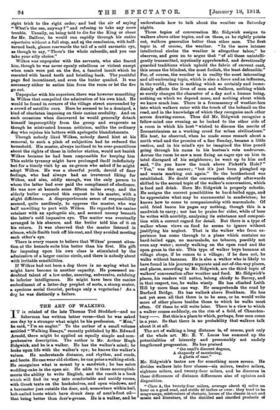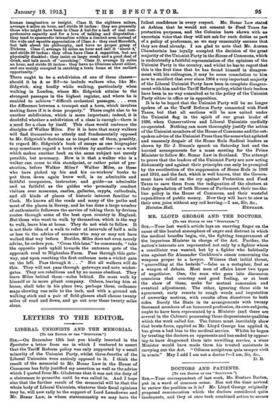THE ART OF WALKING.
TT is related of the late Thomas Tod Stoddart—and no I fisherman has written better verse—that he was asked one day by a stranger what might be his profession. "Mon," he said, "I'm an angler." To the author of a small volume entitled "Walking Essays," recently published by Mr. Edward Arnold, there might be applied an equally simple and comprehensive description. The author is Mr. Arthur Hugh Eidgwick, and be is a walker. He has the walker's mind; he looks upon life with the walker's eye ; he knows the walker's values. He understands distance, and rhythm, and roads, and boots. He can wear old clothes; he can poiae a walk ing-stick. He recognizes what is meant by a sandwich ; be has eaten wedding-cake in the open air. He adds to these accomplishments the ability to write English, and the result is a book which will find its way into comfortable and untidy rooms, with Greek texts on the bookshelves, and open windows, and a barometer just outside the door, and, somewhere within hail, hob-nailed boots which have drunk deep of neat's-foot oil— that being better than deer's-grease. He is a walker, and he
understands how to talk about the weather on Saturday nights.
Three topics of conversation Mr. Sidgwick assigns to walkers above other topics, and on these, as he rightly points out, walkers generalize better than other men. The first topic is, of course, the weather. "In the more intense intellectual circles the weather is altogether taboo," he observes, and goes on to argue that "of all those unintelli gently transmitted, mystically apprehended, and devotionally guarded traditions which uphold the fabric of current cant, this seems the blindest, the most foolish, the least defensible." For, of course, the weather is in reality the most interesting and all-embracing topic, which is also a force and an influence, in the world; there is nothing which so certainly and imme diately affects the lives of men and walkers, nothing which so surely changes the character of a day and a human being, nothing on which we depend more, and nothing about which we know much less. There is a freemasonry of weather-lore into which walkers enter with the touch of the hobnail on the road, and in the knowledge of which they recognize each other across drawing-rooms. Thus did Mr. Sidgwick recognize a fellow-mind one evening as he looked to the other side of a room in which his host "wished to discuss the merits of Zoroastrianism as a working creed for urban civilizations." His host, he observed, when he made some remark about a north wind and the promise of a fine Sunday, became a little restive, and in his mind's eye he imagined the blue pencil going through his name in his hostess's rota tembrarum. Across the room he saw a man fixing an eager eye on him in total disregard of his neighbours; he went up to him and said, "Do you know the track above Pickett's Hole?"
"Yes," was the answer ; "but it's just been ploughed up and wants marking out again." So the brotherhood was established. No doubt the conversation shortly afterwards shifted to the second topic of the walker's conversation, which is food and drink. Here Mr. Sidgwick is properly eclectic. He assigns the correct possibilities to bard-boiled eggs, and be appreciates what may be sacramental in sandwiches; he knows how to come to companionship with marmalade. Of cold fried bacon his pages say nothing, though this is a sandwich to carry; nor has he praise for cider, while of beer he writes with acerbity, analysing its substance and composition with a correct regard for detail. But there is a type of walker whose views on food he seems to ignore without justifying his neglect. That is the walker who from ex perience has come through to a plane which contains no hard-boiled eggs, no marmalade, no tobacco, possibly not even any water ; merely walking on the open road and the open grass in the air. This type of walker buys bananas at village shops, if he comes to a village; if he does not, he walks without bananas. He is also a walker who is likely to have found in his journeys separate and out-of-the-way places, and places, according to Mr. Sidgwick, are the third topic of walkers' conversation after weather and food. Mr. Sidgwick's places, his readers will notice, belong chiefly to Surrey, and in that respect, too, he walks wisely. He has climbed Leith Hill by more than one way. He comprehends the road by Burford Bridge. He has walked, above Bookham. He has not yet seen all that there is to be seen, or he would write more of other places besides those to which he walks most often. Of these he will write later. There is a view to which a walker comes suddenly, on the rim of a field, of Chanctonbury —. But this is a place to which, perhaps, four men come in a year. So that there is no probability that walkers talk about it at all.
The art of walking a long distance is, of course, part only of the whole art. Mr. E. V. Lucas has summed up the potentialities of leisurely and presumably not unduly lengthened progression. He has praised Mr. Sidgwick's tastes are for something more severe. He divides walkers into four classes—six milers, twelve milers, eighteen milers, and twenty-four milers, and he discerns in these differences of distance differences also of opinion and disposition.
"Class A, the twenty-four milers, average about 41 miles an hour on a good road, and stride 40 inches or over: they tend to be mugwumps, mistrnsters of rhetoric, lovers of the classic in art, and music and literature, of the distilled and clarified products of
human imagination or insight. Class B, the eighteen milers, average 4 miles an hour, and stride 36 inches : they are generally those who might have been in Class A but for a lack of real comprehensive capacity and for a love of talking and disputation : they tend to spasmodic intensities within a limited area instead of the wide and equable appreciation of Class A: they read Meredith, but talk about his philosophy, and have no proper grasp of Dickens. Class C, average 34 miles an hour and call it 'about 4,' and stride 30 inches: they often have Clams A capacities, but are physically disabled: they insist on large meals and a good deal of drink, and talk much of 'scorching.' Class D, average 24 miles an hour, and stride 25 inches : they have no illusions about either, and are mainly occupied in catching a train home at the earliest Opportunity."
There ought to be a subdivision of one of these classes— should it be A. or B P—to include walkers who, like Mr.
Sidgwick, sing loudly while walking, particularly when walking in London, where Mr. Sidgwick attains to the strongest passages in the highest register, and where he is enabled to achieve "difficult orchestral passages, . . . even the difference between a trumpet and a horn, which involves making faces if it is done properly." There ought also to be another subdivision, which is more important; indeed, it is doubtful whether a subdivision of a class is enough—there is a need for a class by itself. This class would embrace the disciples of Walker Miles. For it is here that many walkers will find themselves so utterly and fundamentally opposed to Mr. Sidgwick's doctrine as to impel one of them, possibly, to regard Mr. Sidgwick'a book of essays as one biographer may sometimes regard a book written by another—as a work which makes another book on the same subject not merely possible, but necessary. How is it that a walker who is a walker can come to this standpoint, or rather point of prostration, before Walker Miles ? Walker Miles, as those who have picked up his and his co-workers' books to put them down again know well, is an admirable and faithful companion, instructor, and guide—as admirable and as faithful as the guides who personally conduct visitors over museums, castles, galleries, crypt; cathedrals, and all kinds of places of historic interest familiar to Cook. He knows all the roads and many of the paths and most of the places in Surrey, and he has done a large number of enthusiastic followers the service of taking them by devious routes through some of the best open country in England. But those who want to walk by themselves, which is the way to walk, leave him at home. They do not wish to follow. It is not their idea of a walk to refer at intervals of half a mile or less to the advice of someone who may or may not have walked that way before. Besides, Miles does not even merely advise, he orders you. "Cross this lane," he commands, "take the opposite path uphill towards the entrance gate of the approach road to Highashes Farm. Pass through this gateway, and upon reaching the first outhouse note a wicket gate on the left. Pass through it . . ." Not all walkers will do this. They will not pass through gateways and note wicket gates. They are rebellions and by no means obedient. They leave Miles behind them—miles behind. He must walk by himself or in more pliant company. Others, leaving him at home, shall take in his place two, perhaps three, ordnance maps showing one mile to the inch, and with a ground ash walking stick and a pair of field-glasses shall choose twenty miles of road and down, and go out over those twenty miles alone.







































 Previous page
Previous page